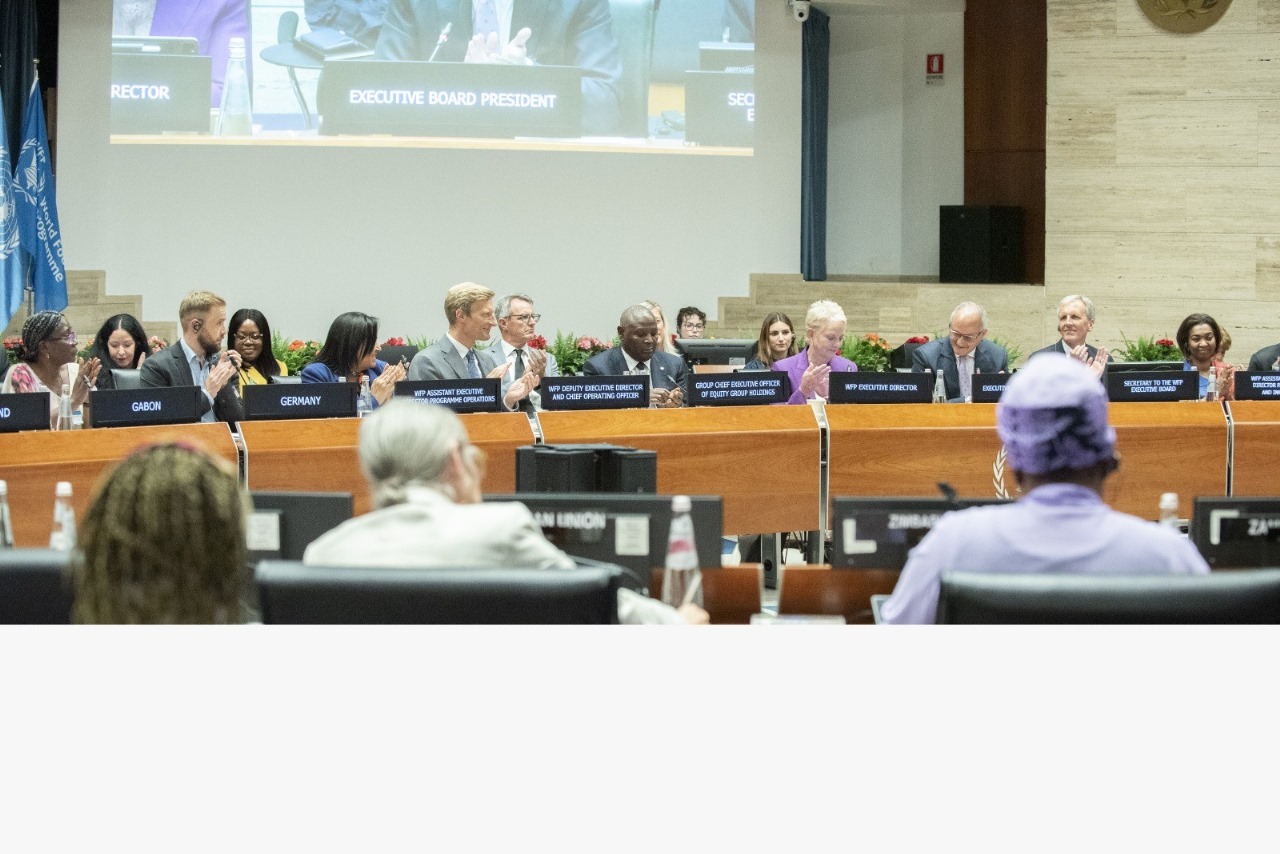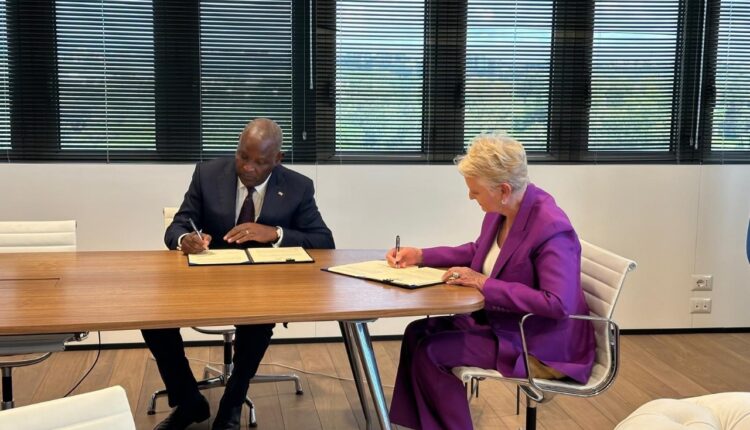EQUITY GROUP AND WORLD FOOD PROGRAMME SIGN HISTORIC AGREEMENT TO ENABLE SMALL SCALE FARMERS TO GROW AND THRIVE

Photo: World Food Programme (WFP) Executive Director, Cindy McCain and Equity Group Managing Director and CEO, Dr. James Mwangi sign historic Agreement to Enable Small Scale Farmers to Grow and Thrive. The framework agreement will enable WFP country offices to link value chain actors in food and agriculture to financial literacy training and concessional financing access through Equity Bank subsidiaries.
…the two organizations are following on a partnership signed earlier this year in the Democratic Republic of Congo to train and offer accessible financing to farmers.

…the new collaboration will scale the project “Promotion of Sustainable Food Security” regionally.
…Dr. James Mwangi addressed the WFP Executive Board session to discuss how the private sector can support sustainable development in agriculture and food security in Africa and globally.
Rome, Italy: 22 July 2024 – Equity Group and the World Food Programme (WFP) have entered into a historic framework agreement to enable WFP country offices to link value chain actors in food and agriculture to financial literacy training and concessional financing access through Equity Bank subsidiaries.
The agreement, signed by Dr. James Mwangi, Equity Group Holdings MD and CEO, and World Food Programme Executive Director, Cindy McCain, on the sidelines of the WFP Executive Board Session in Rome, is a first example of linking WFP’s deep field presence and engagement with value chain actors and financial service providers, and represents a new model of private sector engagement for development impact. The approach aims to support marginalized communities where traditional financing is scarce. Together, WFP and Equity, through the Equity Group Foundation, will provide training of value chain actors to help them to access financing, as well as providing technical assistance to ready agri-processors and agri-preneurs for impact investments offered through Equity Bank.

The agreement is a scaling of a development collaboration between WFP and Equity BCDC in the Democratic Republic of the Congo (DRC) for the project “Promotion of Sustainable Food Security.” This ambitious project, which has been operational in the DRC since 2022, aims to stimulate the development of a sustainable agro-industrial sector that contributes to economic diversification, food and nutritional security, employment, and livelihood improvements. To date in the DRC, Equity BCDC is enabling USD $10 million of loans into local value chain businesses (agri-business), to include smallholder farmers, cooperatives, and food processors – who are receiving technical assistance and concessional financing through Equity.
Invited by WFP’s Executive Director and His Excellency, Ambassador Youssef Balla, Permanent Representative of the Kingdom of Morocco and current President of WFP’s Executive Board, to speak to the Annual Session of the WFP Executive Board, Dr. James Mwangi, Group CEO of Equity Group Holdings outlined the way in which the private sector, partnering with organizations such as the WFP, could play a critical role in transitioning food crises towards resilient food systems not just in Africa but globally. The address was the first time a CEO from the Global South was invited to speak to the WFP Executive Board.
Addressing the Executive Board, Dr. Mwangi reflected on the work of Equity over its 40-year history to support lives and livelihoods of the African people by reconfirming that, “At Equity we have always understood that small-scale farmers underpin the food supply in Africa and around the world. The majority of the 600 million farms in the world, 70%, are small holder, which means farms of less than 1 hectare. Often this is only subsistence farming for family eating. We want to work with partners like WFP to scale outputs and access to finance to facilitate investments in agricultural activities to support farmers to enhance productivity, integrate into value chains, and ultimately improve their livelihoods while contributing to food security, sustainably. Additionally, the Group developed the `Africa Recovery and Resilience Plan’ which is committed to growing our support of access to finance for farmers, who are also dealing with the scourge of climate change, to 30% of our loan book regionally by 2030.”
Smallholder farmers are crucial to food production in most developing countries, providing over 70% of food calories in Asia and sub-Saharan Africa. Developing local food value chains – and supporting the ecosystem of agriculture from production to purchase – is essential for enhancing farmers’ income and livelihoods and ultimately contributing to food security not just in Africa, but globally.
Commenting on the need to work with the private sector to support global food security as the world strives to reach zero hunger, WFP’s Executive Director, Cindy McCain said, “This is a powerful example of how innovative partnerships can address the root causes of hunger. By empowering farmers with the tools and resources they need to thrive, we can create a ripple effect of prosperity that strengthens long-term food security for the whole community.”
In addition to affordable and accessible finance solutions, the two organizations also agree to address farmer education primarily on two fronts: managing crops to be climate resilient and to incorporate regenerative agriculture, crop rotation, soil health and the like into planning, while offering education on how to manage finances to support the cyclical and often uncertain nature of agriculture production. The small-scale farmer also needs access to affordable, easy to acquire and informative data and information allowing them to understand what is happening in their agriculture cultivation while offering them state of the art solutions of how to address their challenges. The partnership will be combined with collaboration on ways to provide the infrastructure support which small scale farmers need to mitigate food waste, crop spoilage, obtain market access and with facilitation efforts to transport their goods to markets.
Dr. Mwangi concluded by saying that, “The food and agriculture pillar of the Equity Group Foundation has positively impacted the lives and livelihoods of 3.8M farmers, with 310,000 being small and medium sized farmers. This is work that we are fully committed to scaling for Africa and for all the world. The Covid-19 pandemic made it very clear that we must diversify the sources of food in the world not just for nutrition but also for job creation. And we must find ways to include the least vulnerable into the scaling up of agriculture production, including refugees,” he said.
Equity Bank’s affordable loans – offered to food value chain businesses in the deep field and the last mile – are also made in partnership with the Groups own impact investor partners including IFAD, and 16 development finance institutions which allow for the Bank to extend their impact investments into more marginalized areas. Its own technology partners such as Hewlett Packard, Microsoft, the Bill and Melinda Gates Foundation and others will support technology solutions, which will enable small-scale farmers to learn, adapt and grow into the formalized food and agribusiness market.
In May at Washington DC, Equity, along with four other co-chair founding partners – Microsoft, Heifer International, Unconnected.org and Syngenta Foundation – under the sponsorship of the US Vice President Kamala Harris, and under the convening of Mastercard Corporation and the African Development Bank (AfDB), came together to form the MADE Alliance (Mobilizing Access to the Digital Economy) to utilize the Community Pass technology platform to address the needs of more than 100 million small-scale farmers. In addition, Equity has been working with Mastercard Foundation for 5 years under the `Young Africa Works Program’ to support agriculture SMEs to grow into formalized businesses with entrepreneurial training and financing.


